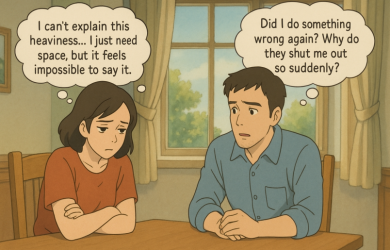5 Tips to Support A Partner Who Has Bipolar Disorder

Unlock Daily 30-Sec Tips for a Happier Relationship
👉 Subscribe FREEKey Takeaways
Marriage.com AI Quick Summary
Bipolar disorder is a psychiatric condition that affects over 4.4% of U.S. adults experience bipolar disorder at some time in their lives. Living with bipolar disorder can be an indescribably difficult experience that varies with every individual.
Proper diagnosis can be tricky because many people only seek treatment for the depressive side of the experience. The “up” side can sometimes be quite pleasant and even desired for some people.
That being said, the wrong diagnosis and treatment can be deeply disruptive to care and can even make symptoms worse.
This can lead to frustration and isolation and, at times, dangerous symptoms that cause a great deal of suffering to the person experiencing the symptoms – as well as the people around them who are also impacted.
Being in a relationship with someone who is bipolar can be difficult, it can also be just as rewarding as any other relationship with a fellow human.
This article will provide some tips on how to best support a partner who has bipolar disorder.
First of all, to deal with a bipolar person it’s important to develop open communication with supportive and trustworthy family members and friends.
Often, those who are in love with and are living with someone with bipolar disorder can feel helpless or scared to say the wrong thing.
Developing open positive communication about your family’s needs can help empower others to be helpful when you need them the most.
Sometimes just having a friend you can call to bring over a meal and chat during difficult times can make a world of difference.
In bipolar relationships, it’s important to be patient and avoid the temptation to dive too deeply into research and clinical information as it can be overwhelming.
There is potentially much to unlearn about bipolar disorder from what you have seen in the media before you can start learning about your partner’s bipolar behavior.
Also watch:
Watching your partner have an episode can be unsettling and even triggering.
When symptomatic, people with bipolar disorder can have alarming symptoms and may say and do very uncharacteristic things. It can be hard to depersonalize when interactions feel tense or unpredictable.
Not everyone needs the same kind of support, so it can be helpful to develop a “support toolkit” during times of balance to help guide the couple through the rougher times.
This toolkit should be continually evolving – updated as you discover new things that are helpful (or editing out things that aren’t) so you can fine-tune it to be the most helpful.
Here are some tips that other couples have identified as helpful to get you started.
Remember – just because a tip is on this list doesn’t mean it will be helpful to you and your situation.
I recommend you look at these tips as menu options to discuss with your partner and potentially include in your toolkit.
1. Be objective and patient
When your partner’s mood starts to shift, it can be helpful to reflect what you are seeing and hearing as objectively and patiently as possible.
Ideally, you will communicate about this when you are not feeling triggered. It can be helpful to root this conversation in a sense of love for your partner.
Examples of this could be “I’ve noticed you seem more stressed than usual lately. You have been speaking a bit lower and faster than usual and a few of your facial expressions are ones I don’t normally see you use”.
Or “I’ve noticed you have been staying up later and waking up before your alarm. You’ve also taken on a lot of new projects this week and seem really energized. How are you feeling?”
2. Get professional help
Making sure you are getting enough professional support is also really important in bipolar disorder relationships.
Both you and your partner need support to help you navigate the emotional roller coaster that can often come with bipolar disorder.
Additionally, couples’ therapy can relieve the stress on both of you to solve the problems within the relationship yourself.
Don’t wait until there is a crisis to assemble a team of professionals you trust.
You want the team in place so they can help you navigate the whole process as skillfully as you can.
Ideally, you will all work together as a team when things get difficult. For most people with bipolar disorder, this also involves a medication plan.
3. Plan for the worst
Sometimes bipolar disorder symptoms can rapidly go from minor to major. It’s important that your plan includes what to do when things escalate quickly.
You may want to work with your prescribing provider to identify medication changes to put in place when your partner is feeling hypomanic or depressed, as well as a plan for if and when it becomes a bigger issue potentially needing hospitalization.
Some people keep a dose or two of a strong sedating medication on hand to use if they become severely symptomatic or too paranoid, for example, to trust the plan or the loved ones trying to help with them.
Your plan should include information about the nearest emergency room and how to contact your doctor on off-hours.
4. Indulge in self-care
Self-care is more important than it might seem.
It can be exhausting to support a partner through bipolar disorder, and it’s important to know where to set limits and take breaks for self-care.
Disregarding your own needs, while easy to do in the face of crisis, ultimately leads to burnout and potentially resentment.
A plan should include tending to the needs of both partners – don’t leave yourself out.
Exercise, mediation, crafts, and sometimes just taking breaks can be essential ways to keep your fuel tank from hitting empty. And finding a good therapist for yourself can be one of the most useful steps you can take.
5. Understand your partner’s disorder
It’s also important to not frame everything about bipolar disorder as negative or “symptoms.”
To the person experiencing a hypomanic episode, things can feel great and productive. Many great creative works have emerged from hypomanic episodes.
You wouldn’t expect Vincent Van Gogh’s girlfriend to say “Oh no! You are painting again?!”
As a couple, it’s important to work together to pick apart the good parts from the more dangerous parts and to develop language that feels helpful to everyone involved.
Ultimately, it’s important that you and your partner keep your connection and care for each other at the center of your relationship.
When you are feeling connected and balanced, it’s important to take that opportunity to be present and open-hearted with your partner.
The trust and connection you develop when they are not symptomatic will help get you through some of the harder times down the road.
 Tips
Tips
Write your tip or submit a video tip
All tips are reviewed before the publishing.
Share this article on
Want to have a happier, healthier marriage?
If you feel disconnected or frustrated about the state of your marriage but want to avoid separation and/or divorce, the marriage.com course meant for married couples is an excellent resource to help you overcome the most challenging aspects of being married.
Related Articles
Recent Articles
Related Quizzes
Unlock Daily 30-Sec Tips for a Happier, Healthier Relationship
👉 Subscribe FREE on YouTube We'd love your feedback!
We'd love your feedback!
 Expert Q&A
Expert Q&A
Ask your question related to this topic & get the support you deserve from experts.



















 Thanks for your feedback!
Thanks for your feedback!